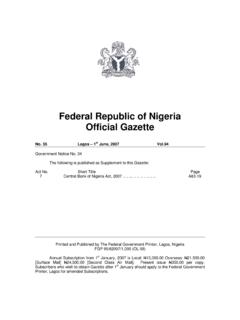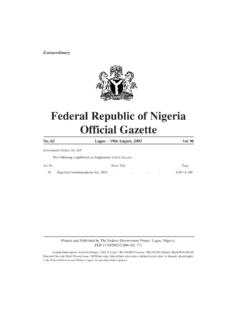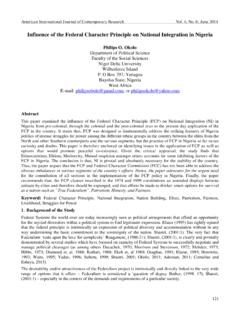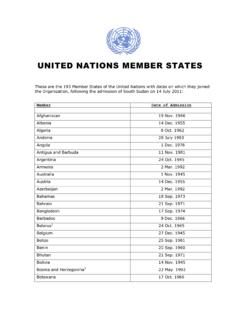Transcription of Implementing Vocational and Technical Education …
1 128 International Journal of Scientific Research in Education , JUNE 2013, Vol. 6(2), 128-148. Implementing Vocational and Technical Education Programmes in South-South nigeria : A Case of Rivers State Innocent Osami Department of Educational Management Faculty of Education University of Port Harcourt, nigeria .. Abstract This study examines the implementation of Vocational and Technical Education programmes in Rivers State. Five (5) research questions and three (3) null hypotheses were formulated to guide the study. A socio- Technical system approach supported by human capital theory provided the framework for the study. A descriptive survey design was used for the study and the population was comprised of the five public Technical colleges in Rivers State. A sample of 144 academic staff were selected using a stratified random sampling technique. Respondents completed a 30-item Vocational and Technical Education programme Implementation Assessment Questionnaire (VATEPIAQ) designed by the researcher based on a Likert-type scale.
2 Observation schedules and document analysis were also used to assess the state of facilities and quality of staff recruited for Vocational and Technical Education programmes. This study finds that the quality of teaching staff in Vocational and Technical schools is moderately high, but relatively inadequate. Vocational and Technical school facilities in Rivers State are also inadequate and in poor condition. Significant differences do not exist in the mean scores of principals and Technical teachers on the funding strategies adopted by government. Likewise there were no significant differences in the mean scores of principals and Technical teachers on the strategies adopted by government to improve the implementation of Vocational and Technical Education programmes. This study recommends that only professionally qualified Technical and science teachers be recruited into the system.
3 Those without professional qualifications already in the system must be encouraged to undergo post-graduate diploma courses in Education . Finally, co-operative Vocational Education programmes should be incorporated into the Technical Education curriculum for the purpose of providing comprehensive and practical Education in our Technical schools. Keywords: Implementation, Vocational Education , Technical Education , South-South nigeria . Reference to this paper should be made as follows: Osam, I. (2013). Implementing Vocational and Technical Education Programmes in South-South nigeria : A Case of Rivers State. International Journal of Scientific Research in Education , 6(2), 128-148. Retrieved [DATE] from .. Copyright 2013 IJSRE 129 INTRODUCTION With the onset of colonialism and the introduction of Western Education in nigeria , science and Technical Education have long been treated as relatively insignificant aspects of the country s Education system.
4 This has created a situation whereby the majority of Nigerian youth, especially prior to the last decade, were trained for clerical and/or white collar jobs and so failed to develop a number of practical skills. The early pre and post-independence Education policies aimed at sustaining the new and independent political structure and administration thus led to high rates of unemployment, and increases in crime rate and juvenile delinquency. In other words, the marginalization of practical Education indirectly fed the creation of new social problems that nigeria continues to contend with (Fafunwa in Nwosu, 2005). It is increasingly important that schools not only develop the mental, moral and physical capabilities of the students, but also enable them to acquire skills in technology, including computer literacy, so that they might participate effectively in contemporary economic activities (Ololube & Egbezor, 2012).
5 In other words, it is the role of the Education system to ensure that the population is reproduced culturally and socially, and that the children, in particular imbibe the values and skills they need to function as mature adults. The political, economic and cultural changes brought about by the country s independence highlighted the need for total reform of the Education system in nigeria . In 1969 a national curriculum conference was held in Lagos in response to this need. Its greatest result was a new philosophy for Nigerian Education that later gave birth to the National Policy on Education first published in 1977 and later revised several times (1981, 1989, 2004). The National Policy on Education became the first document to streamline Education concepts and goals and to prescribe uniform operation of the country s educational system, thereby giving Vocational and Technical Education programmes in nigeria a scheme of place.
6 Vocational and Technical Education , according to Yusuf (2006), is a form of Education that seeks to prepare persons for employment in recognized occupations. This type of Education provides the skills, knowledge and attitudes necessary for effective employment. Odogwu (2005) describes Vocational Education as a type of Education that emphasises preparation and participation in an occupation of social value. Contrasted with general Education , Vocational Education is skill-oriented and trains both the head and the hands. (Oranu, 2009) The Federal Republic of nigeria (2004) further describes Vocational Education as that aspect of Education that leads to the acquisition of practical skills as well as applied scientific knowledge. This type of Education was underemphasised in the early Nigerian Education . Jacob (2006) lamented that in the early Nigerian Education system, little focus was placed on Vocational and Technical training that could produce persons adequately skilled, confident and properly oriented towards eventual self-employment and self-reliance.
7 This phenomenon, he concludes, accounts for the large scale unemployment of youth still today. This neglect does not in the least suggest that there were no attempts by the government in those early days to implement skill acquisition and training. To the contrary, Nworise (2006) reports that attempts were made to introduce Vocational and Technical Education into the school system as far back as 1847, with the recommendation of the Privy Council to the colonial office. The committee recommended among other things that Nigerian schools should: Provide a means of improving on the conditions of the peasantry by teaching them how health may be preserved by proper diet, cleanliness, ventilation and clothing. Give practical training in household economy and in the cultivation of the cottage garden as well as those common hand crafts by which a labourer may improve his domestic comfort. Provide an improved agriculture to replace the system of exhausting the virgin soil and living to natural influence alone the work of reparation.
8 In the traditional period, Vocational programmes included: metal smelting, weaving (cloth and mat), dyeing, pottery, leather work, bead making, wood carving and canoe carving, artistry, agricultural activities, singing, dancing, music, hair styling, tattoo or body art, and hunting. The modern Vocational curriculum, which has been enlarged, includes: carpentry and joinery, furniture making, baking, shoe making and repairing, dress making, sign writing, photography, metal work, hairdressing, fashion design, fabrication, motor mechanic work, electronic servicing, mechanical engineering, building, home economics, advanced agriculture, and secretarial and accounting work. Today it is referred to as Vocational and Technical Education to justify the application of science and technology in the training of most of the contemporary trades and crafts (FRN, 2004). The objectives of Technical and Vocational Education in nigeria today are such that if adequately implemented, will bring about the revolution of technological development in nigeria thereby having a significant and positive impact on the national economy.
9 These objectives include, among others, the training of manpower particularly at professional grades, the provision 130 of Technical knowledge and Vocational skills, and providing training and skills that lead to the production of craftsmen, technicians and other skilled personnel (FRN, 2004). The fact remains, however, that none of these will be accomplished if students in schools are improperly trained. Effective training of students cannot be accomplished in the absence of certain ingredients that create conducive environments for teaching and learning. These ingredients include the right quality and quantity of teachers, well equipped workshops and laboratories with up-to-date materials, and adequate tools and other materials. Omekwe (2009) argues that for the effective implementation of any Education programme , adequate human and material resources must be made available to the schools.
10 In particular, a large enough number of trained teachers with different types of expertise (science, language, technology, etc.) must be recruited and posted to the schools as and when required. In addition, for effective management, academic staff must be complemented by non-academic staff in proportionately adequate numbers. The importance of Vocational and Technical Education cannot be overemphasized. The Federal Republic of nigeria (2004) noted that the federal government recognizes the importance of Vocational and Technical Education and the need to relate its programmes to the requirements of commerce and industry. The Curriculum Conference of 1969 did, in fact, give Vocational and Technical Education its deserved position and prominence. Likewise, the Federal Republic of nigeria (2004) has since recommended that Introductory Technology, Practical Agriculture and some pre- Vocational subjects be made core subjects at junior secondary schools.








